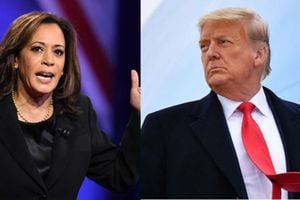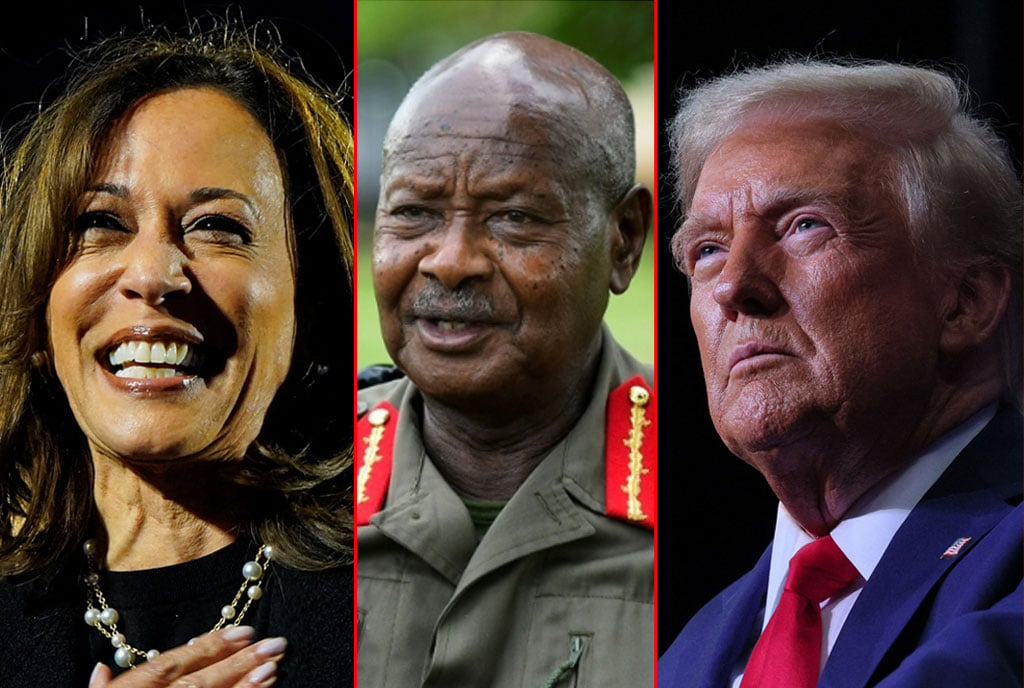
Chocolate bars with the faces of Democratic presidential nominee U.S. Vice President Kamala Harris and Republican presidential nominee and former U.S. President Donald Trump are displayed at a store in John F. Kennedy International Airport, New York, U.S., October 25, 2024. PHOTO/REUTERS
The US heads to the polls today, with many across Africa, including Uganda, hopeful that the incoming president will maintain foreign aid that supports educational programmes.
The US has significantly contributed to Uganda's education sector through scholarships, partnerships, funding, and capacity-building initiatives.
In addition to foundational support, the US has been instrumental in developing higher education through university partnerships, faculty exchanges, and research grants.
These collaborations equip Ugandan students and educators with valuable skills and opportunities, contributing to national development goals.
There is a particular emphasis on promoting gender equality within Uganda’s education system, with US-supported programmes focused on reducing barriers for girls and young women.
US support for refugee education has also helped integrate thousands of refugee children into local schools, providing them with vital resources and stability.
The United States Agency for International Development (USAID) has funded numerous education programmes in Uganda, targeting basic education, literacy, and skills development.
USAID plays a critical role in improving education by focusing on literacy, teacher training, digital education, and STEM initiatives, particularly in underserved areas.
Additionally, US government exchange programmes, such as the Young African Leaders Initiative (YALI) and the Mandela Washington Fellowships, have enhanced educational and leadership opportunities for Ugandans by providing training, mentorship, and networking prospects.
YALI is a US-based programme designed to empower and train young African leaders to drive positive change in their communities.
Launched by the US government in 2010, YALI offers training in areas such as business, public management, and civic leadership to promising young professionals from across Africa, including Ugandans.
It provides intensive learning experiences that prepare students for higher education and equips them with skills in critical thinking, problem-solving, and leadership.
Mandela Washington Fellowships on the other hand is part of the broader YALI launched by the US government, for young African professionals aged 25-35 who demonstrate leadership in their communities or professions.
The selected fellows participate in a six-week academic and leadership institute in the US, focusing on fields like public management, business, and civic engagement.
The programme also provides networking opportunities and, in some cases, funding for projects or ventures. Ugandan participants return with skills, networks, and resources to drive impactful changes in sectors like education, health, and governance.
Regarding the education policies of presidential candidates, Donald Trump and Kamala Harris have different pledges that could significantly impact foreign support for education in Uganda.
Trump's administration has historically emphasised reducing foreign aid to prioritise domestic issues.
If he were to revert to this approach, educational initiatives in Uganda could face cuts, particularly in USAID-funded programmes, potentially limiting access to literacy and basic education, especially in rural areas.
Trump's education platform includes promoting school choice, reducing federal control over education, and addressing student loan debt by allowing refinancing and reducing interest rates.
In contrast, Kamala Harris is likely to support and increase foreign aid for education, emphasising global partnerships and development goals.
If elected, Uganda might see sustained support for digital and inclusive education programmes that align with Democratic priorities.
Harris has advocated universal pre-kindergarten, increased funding for low-income schools, and enhanced teacher support, including higher pay and professional development.
She also focuses on making higher education more accessible and affordable through student loan debt cancellation and increased funding for Pell Grants and other financial aid programmes.
Ugandans speak out
Mr Patrick Kaboyo, the executive director of Education Advocacy Network, says the education sector heavily relies on foreign support and that if the election outcomes are in favour of African nations like Uganda, the country has reason to celebrate. “In Uganda, education sector is support by a number of development partners.
Uganda currently needs serious funding when it comes to introducing and implementing new curricula because the country cannot do it single handedly,” Mr Kaboyo said.
Mr Fagil Mandy, a renowned educationist, said: “It is not easy to tell now. It takes a lot of things. Nobody has shown us their method of working. The impact of election is farfetched.
Mr Filbert Baguma, the secretary general of Uganda National Teachers Union, said Uganda should pray that whoever goes through supports Uganda to ensure continuity of the programmes and introduction of new ones.
“We need to be on standby and see who wins and what that means to us. The moment the one who does not support our programmes is elected, we shall have gaps in funding yet most of the education programmes are funded externally. We need to pray,”Mr Baguma said.




